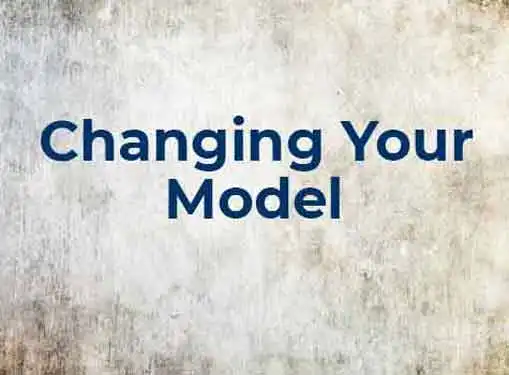Starting Your Business
Changing Your Startup Business Model
Written by James Garvin for Gaebler Ventures
Very few entrepreneurs get their first business model exactly right the first time. One attribute that helps elevate successful entrepreneurs is the ability to notice when change in a business model is necessary and making those changes
There are very few times where a new startup writes down their business plan that unfolds into exactly how it was written.

Startups are dynamic organizations that change and shift plans as new information becomes available. Understanding and knowing how and when to adapt and change your plans are critical for any businesses.
Obviously change can have its negative consequences as well. Your team can get frustrated by constant change and feel as if they are simply running in circles, not moving forward. Drastic change is usually a last call effort to prevent such internal confusion, but minor changes here and there will be required to getting your startup on the right path toward success.
Startups usually start on an intuition or observation of a problem. Because the product or service that a startup is producing does not yet exist in the market, all of the information that goes in to building the startup are merely based on hypothesis or calculated estimates. They are not yet facts because they simply do not exist.
Steve Blank, author of "The Four Steps to Epiphany" provides entrepreneurs with sound advice about how being flexible and dynamic is key to any emerging organization, no matter what industry. He tells a story of an entrepreneur who wrote a detailed 60-page business plan before the company even launched only to find that things changed dramatically from what was supposed to happen according to the business plan and what happened in reality. Business plans are meant to be a guide, not a strict set of rules at which you can not deviate from.
As a founder and as an entrepreneur, you have obviously found an opportunity in a market and for a specific customer segment, however until you actually start trying to sell your products and services, you cannot 100% accurately predict what customer responses will be.
PayPal started out as a cryptography firm that later allowed payments to be made between Smartphone's. Nowhere in their original business plan, did they set out to become the global leader in online payment management. This business model evolved as Paypal worked on one product, worked with customers, and continuously fine tuned their product until they had the PayPal that we know today.
Successful entrepreneurs understand that they must evolve as their company evolves. Even mature companies cannot accurately predict what the future holds, what customer or competitor responses will be.
The trick is to balance the need to make minor adjustments and changes as new information dictates, without seeming like you are running in circles by changing to drastically or to often. As a startup, you have the advantage of being flexible and dynamic. Use this to your advantage by modifying your company and your products to meet evolving needs in the market. Keep your mission statement and business plan as a sounding board to ensure that you are not drifting completely into unchartered waters, but do realize that you will need to change and adapt to grow and succeed.
James Garvin began his education studying biotechnology. In recent years he has turned his interest in technology to helping two internet startup companies. The first business was an online personal financial network and the second was an e-marketing platform created to help entrepreneurs demo their web sites. Currently a student at University of California Davis, James is spending his summer incubating two new online businesses and writing about his entrepreneur experiences.
Share this article
Additional Resources for Entrepreneurs


Conversation Board
We greatly appreciate any advice you can provide on this topic. Please contribute your insights on this topic so others can benefit.